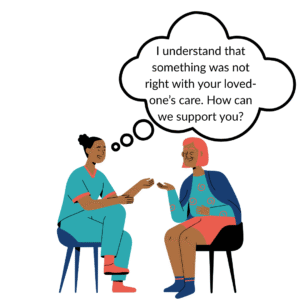Experiences, outcomes and actions of relatives or close friends (“carers”) when someone is harmed in the NHS or adult social care settings
What is the aim of the project?
The project aims to understand family or close friends’ (“carers”) perspectives when someone (who they provide care for) has been physically or psychologically harmed in the NHS or adult social care settings. We would like to understand their experiences and effects of harm, their support needs and the support they give their loved one (e.g., making complaints) after harm.

Why is this important?
Involving carers in the aftermath of physical or psychological harm in NHS or adult social care settings is important. Such events can have a negative effect on carers’ health and wellbeing. These effects can be direct or indirect, due to increased intensity or scope of caring after the harm. They often also play a vital role in supporting decisions and taking action after harm (e.g. whether to make a complaint or pursue litigation). Carers often adopt the important role of primary representative and decision-maker in the aftermath of harm, especially where the person harmed cannot speak for themselves.
There has been little research on carers’ insights into harm. This study seeks to address this gap. Understanding carers’ perspectives will be used to develop recommendations for policy and practice designed to improve carers’ experiences and support their health and wellbeing after harm.
What will the project involve?
Interviews will be conducted with up to 30 carers of people, who have experienced physical or psychological harm in the NHS or adult social care settings. We will analyse the interviews to understand carers’ experiences, what effect it had on them, and what helped (or could have helped) in the aftermath of harm. We will also develop recommendations.
This will be used to prepare a written summary, journal article and presentations. These will be shared with different audiences, including carers, carers charities, NHS and adult social care providers, health and care professionals, and policy makers.
How can I find out more?
If you would like to find out more and (potentially) take part in an interview, please refer to the study information here: https://www.qso.ac.uk/wp-content/uploads/sites/91/2025/10/Participant-Information-Sheet_v1.0.pdf.
Project Team
Dr Michele Peters (PI)
Dr Stacey Rand
Dr Siabhainn Russell
Sarah Markham
Rashmi Kumar
Timeline
July 2024 to April 2026
